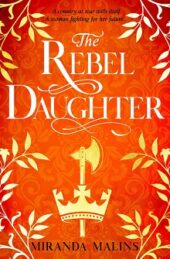Miranda, The Puritan Princess was your debut novel about the Cromwell family. You’re also a Trustee of the Cromwell Association. When did your interest in the Cromwells begin and what sparked it?
My fascination with Oliver Cromwell and his family began as a teenager when I visited their house in Ely. It is such an ordinary home and yet, through the extraordinary tumult of the Civil Wars,
the family that was raised there rose to become Britain’s ruling dynasty living in the splendour of the royal palaces. This is an extraordinary story but one that has been strangely neglected. I want to revive interest in this vital period of British history and re-insert the brilliant women of Cromwell’s family into the heart of it.
The main character in the novel is Frances Cromwell. Can you describe Frances’s character and why you chose to focus on her over her siblings?

Frances Cromwell, 1638-1720.
I wanted to write about Cromwell’s daughters as they were famous for their bold characters and have never before been written about. Frances’s story is instantly gripping: as Cromwell’s youngest, unmarried daughter, her marriage prospects were intimately tied to the greatest political question of the time – whether he would become king. But Frances refused to be a mere political pawn: she fell in love against her parents’ wishes and refused to give her lover up. She was passionate, loyal and determined with a wonderfully flirtatious sense of humour. Finally, I’m the youngest of three sisters so naturally identified with her!
Was it a challenge to find sources and details about her during your research?
Yes. While Frances and her mother and sisters appear in the sources and historical accounts, it is usually at the margins. This was one of the reasons I found fiction a better vehicle for exploring their experience and relationships than history. However I did find out enough about her to ground my novel in fact. We have some of her letters and others between her various siblings which reveal the closeness of the family and the particular dynamics between them. These letters, and other contemporary accounts, provide insight into Frances’s controversial love affair too and her lavish wedding is described in great detail in the press. Finally we have several wonderful portraits which help bring her to life.
What made you choose to write in first person and what do you find are the benefits?
Writing in Frances’s voice gave the story an immediacy and intimacy that drove the plot onwards. It also shaped the novel in wonderful ways. I was constrained to only write scenes where Frances could have been present which, at a stroke, ruled out endless tedious accounts of Parliamentary or Council debates. This forced me to be more creative to keep the story active and avoid a succession of scenes of women waiting for men to bring them news! Frances’s voice also helped me overcome the challenge of hindsight: she does not know what will happen and so, while we are in her mind, neither do we. This is especially powerful in this ‘Interregnum’ period which is so often dismissed as an interlude before the inevitable Restoration. Finally, writing from Frances’s perspective enabled me to present an entirely new depiction of Oliver Cromwell as a father first and foremost.
Oliver Cromwell continues to stir up passions, over 350 years after his death. His conduct in Ireland being the most significant cause. What are your thoughts on his actions there?
Cromwell’s horrific and devastating military campaign in Ireland was a tragedy and left an indelible stain on his reputation. All historians and writers engaging with him have to confront this and acknowledge it. I would never excuse his actions (nor is it my place to) but, as with all events in the past, it helps our understanding to see them in their contemporary context. Cromwell’s Irish campaign was part of the third in a succession of increasingly desperate and violent civil wars and his actions were within the accepted conventions of siege warfare at the time. But nevertheless it remains the hardest part of his story to tell.
Historical fiction is a great introduction to history. Are there any historians that you’d recommend to readers once they’ve put down The Puritan Princess?
Oh so many! While the Civil Wars and Cromwells are neglected in popular culture, the academic tradition in this period is phenomenally rich. There are new biographies of Cromwell most years and an epic and long-overdue edition of all his writings and speeches will be published by OUP soon. Paul Lay’s Providence Lost of last year is a vivid account of Cromwell’s Protectorate and you still can’t beat Antonia Fraser’s biography for sheer colour and an unusual degree of attention on Cromwell’s family. For a treasure trove of scholarship and more light-hearted coverage too, visit the Cromwell Association at olivercromwell.org
If you could witness one event from the period, what would it be and why?
I would love to have been in the audience in Westminster Hall for Cromwell’s magnificent second investiture as Lord Protector in June 1657. It was in effect a coronation: Cromwell was enthroned on the 14th century coronation chair, dressed in royal robes and ermine, with all the symbols of royalty save the crown. Everyone who was anyone was there, including ambassadors from all the major European powers, and in this sacred moment the Cromwell dynasty looked unassailable. It was also quite the party! There was a magnificent procession through London, feasting and celebrating at the palace and in the streets as the city’s fountains flowed with wine.
Are there any historical fiction writers and/or podcasts you’d recommend for those who want to find out more?
Luckily we are living in a golden age of historical fiction, thanks more than anyone else to the wonderful Hilary Mantel. Read her Thomas Cromwell trilogy for a vivid insight into Oliver Cromwell’s famous great-great-great-uncle. You can also immerse yourself in this period in the page-turning novels of Andrew Taylor and S G Maclean. There is a super Civil War podcast called CavalierCast and some great coverage of this period on others like Versus History. Tom Holland and Dominic Sandbrook said in a recent interview about their podcast The Rest is History that Cromwell is “the single most interesting man in British history” so you could start with that!

The Puritan Princess, published by Orion, is the debut novel from Miranda Malins.






